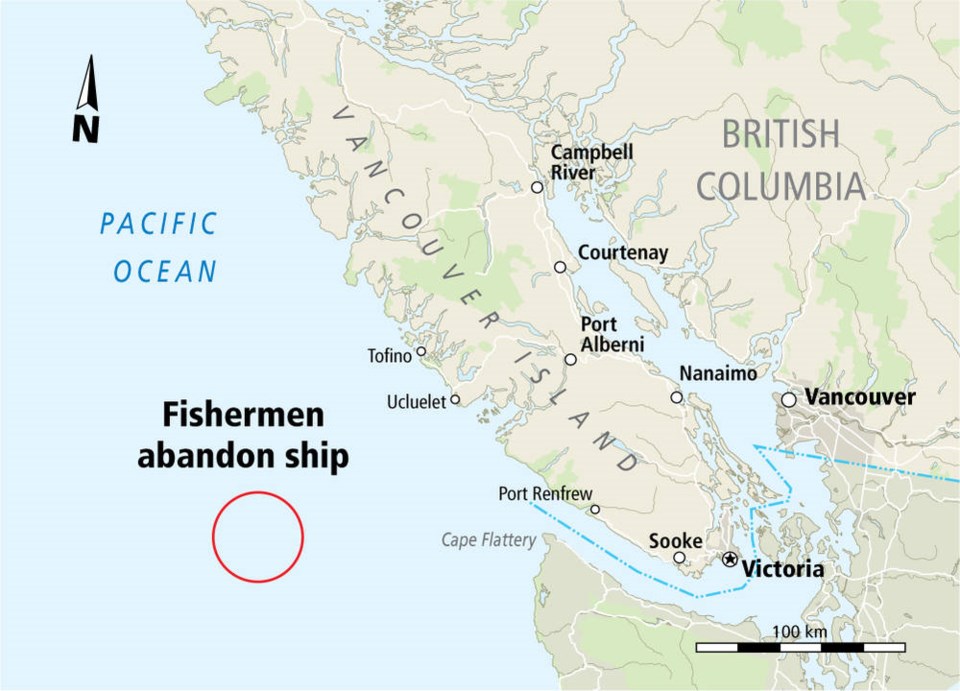Two fishermen are dead and one has been rescued after a commercial tuna fishing boat that left Cowichan Bay capsized early Tuesday off Washington state.
The B.C. Coroners Service said the deceased men were flown to Victoria where a coroner took jurisdiction of investigating the deaths. The coroner is not releasing the identity of the men.
One fisherman was found alive in a lifeboat by U.S. Coast Guard officers and, after an extensive search, the bodies of the missing men were found.
Multiple coast guard units received a radio mayday call about 2 a.m. Tuesday from one of the fishermen aboard the 20-metre Arctic Fox II reporting that the vessel was taking on water and the three people on board planned to abandon ship, the U.S. Coast Guard said in a statement.
The boat was about 136 kilometres offshore of Cape Flattery, which is the northwestern-most point of the contiguous United States and just south of Port Renfrew across the Juan de Fuca Strait.
The fisherman reported they were wearing survival suits.
An MH-60 Jayhawk helicopter crew from Oregon and a search-and-rescue aircraft from California searched from the air and spotted a lifeboat carrying one survivor.
The fisherman was hoisted into the helicopter and taken to a coast guard station in Neah Bay and transported to a local medical clinic where he was in stable condition, said U.S. Coast Guard public affairs officer Petty Officer Michael Clark. The U.S. Customs and Border Patrol assisted in taking the fisherman back to Canada.
Cowichan Bay’s harbour manager Mark Mercer said the boat’s skipper, Tom Lindberg, was “very able, very qualified and highly skilled.”
Mercer, who has known Lindberg for eight years, said he saw Lindberg on Aug. 1, the day before the Arctic Fox II left Cowichan Bay to fish for tuna in the west coast waters.
He said the skipper’s voyage was delayed by a week because he was having trouble finding a crew. Mercer said he didn’t know the two crewmembers well, but said they were younger men.
“You’re fishing off the west coast, it’s nasty out there. When you’re fishing for tuna, they can be up to several thousand miles off shore,” Mercer said. “It doesn’t matter now skilled or talented your crew is, Mother Nature is Mother Nature. It’s the most dangerous job in the world and 90 per cent of that is because of the weather.”
What caused the vessel to take on water will be the focus of an investigation, Clark said. At the time the vessel began taking on water, the wind was blowing at 25 to 30 knots, with three- to four-metre waves and a water temperature of 13 C. It’s still unclear whether Transport Canada will lead the investigation because it involved a Canadian vessel, Clark said.
“The individual’s proper use of survival suit and the deployment of the life-raft played a role in the member’s survival,” Clark said.
WorkSafe B.C. said it was notified about 10:15 a.m. Tuesday about a serious incident involving a commercial fishing vessel and has initiated an investigation.
“The purpose of the investigation is to determine the cause of the incident, and any contributing factors, so that similar incidents can be prevented from happening in the future,” a spokesperson for WorkSafe B.C. said in an email.
The B.C. Coroners Service said their fact-finding investigation will look to determine cause of death and, if possible, may make recommendations aimed at preventing death in similar circumstances.
The Arctic Fox II is registered to Teague Fishing Corp. in Shawnigan Lake, according to Transport Canada’s vessel registry. The Scottish-built wooden troller was built in 1947 and its port of registry is Victoria.
An employee with company said Tuesday they would not be providing any statements to the media.



